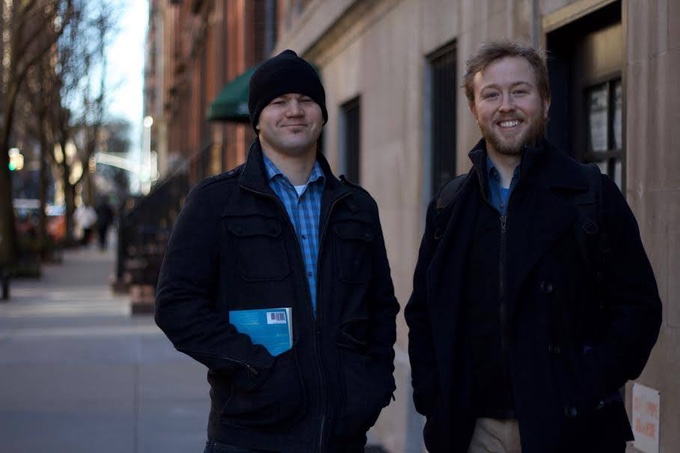New Interfaith Venture Focusing on Jesus

Friend Cory Markum is launching an exciting new project called Hinge — a collaboration between an atheist and a pastor exploring questions of religion and philosophy concentrated on the figure of Jesus Christ. Cory and his co-host Drew Sokol will travel around the country, interviewing such high-profile names as Stephen Law, Matt Dillahunty, Philip Yancey, Michael Shermer, Craig Blomberg, Mike Licona and Robert Price. Check out their intro and pitch below.
The pitch:
“In one sense, Hinge is a story-driven podcast about this enigmatic and incomparable historical figure, Jesus of Nazareth. Who was he? Why do historians come to such opposite conclusions about what he said and did? Why has the story of his life had such an enormous impact on the world? Is it right to call him the hinge of Western Civilization itself? And what on earth do we do with the miracle claims?
But in another sense, Hinge is about so much more than that. Beyond historical inquiries, Hinge is about people and the human experience. As engrossing as the story of Jesus is, what’s just as gripping are the experiences of people who wrestle with the claims about his life. We want to tell their stories–powerful stories of belief, doubt, and the manner in which they govern our lives, for better or worse. These stories, sometimes humorous and uplifting, other times heart-wrenching and hard to listen to, will be weaved into a captivating exploration of history, religion, and even scientific discovery about the most revered man in the history of our species.”
While I support the aims of the project in principle, I do take issue with two of the above names straight off the bat: Mike Licona and Robert Price. As I see it, these are two sides of the same problematic coin in that neither represent mainstream biblical scholarship. Not even close, in fact.
Licona is a professor at Houston Baptist University who earned his MA at Liberty University, both right-wing fundamentalist institutions existing far outside anything resembling mainstream academia. His book on the resurrection is a piece of fundamentalist propaganda dressed up as historical-critical work (he even misuses the term “historiographical” in the title), and a sign of the weakness of the boundaries of the discipline. This is not a scholar committed to keeping his biases in check. He’s a biblical theologian, at best, and no amount of puffery about his book will make it into something it isn’t.
As for Price, he’s a favorite of Christ mythicists: those vocal skeptics who make the claim that no historical Jesus underlies the New Testament gospels. It’s of paltry concern to the mythicist base that the vast majority of relevant scholars — including Jews, atheists and agnostics — reject this proposition, in keeping with the methodological principles employed in the field. That the number of scholars who share Price’s views on the historical Jesus aren’t enough to fill a tinfoil hat is explained away by charges of institutional bias. The academy, they say, is stacked against mythicism, and systematically suppresses dissenting voices — which of course is the same line peddled by creationists and climate deniers.1
Like his ideologue-in-arms Richard Carrier, Price is regarded for straining evidence and reasoning beyond their breaking point. Most importantly, his conclusions have failed to convince historians who have taken the time to look at his work. Now knowing what I do about the gentlemen involved, I doubt this podcast will seriously entertain mythicism. But the reality is that Price’s views are so wacky and schizoid that his inclusion will inevitably muddle the conversation for listeners and could actually impair the podcast’s credibility by virtue of false balance. The fact that there exists an opposing view, regardless of its merits or lack thereof, does not mean it should be cast as legitimate as any other in the field. And since lay listeners are unlikely to know about Price’s standing in the field, they’re therefore unlikely to detect the false balance.
Both of these picks represent highly fringe scholarship, and I’m not the first to express concern that fundamentalists and other ideologically driven “scholars” are fractionating the field by substituting ideology for pragmatic historical method. In my mind, Price and Licona are two clear examples of this. But I suppose that’s a discussion for another day.
Despite the above reservations, the message of this project is more important than any of the guests they’ll be interviewing. The goal, I take it, is not ultimately to convert the other to their way of thinking, but rather to demonstrate the possibilities of civil conversation on polarizing issues. Confining ourselves to ideologically pure bubbles helps no one. This project should serve as a model for forging real connections across the aisle by highlighting the central human experience of grappling with belief and doubt. You can read more about their story on their Kickstarter page. Consider contributing if you’re so inclined.
- Remember that appeals to majority are justified when the majority in question is the consensus of experts. A consensus in science or history exists for a reason. As in the case of climate change, a consensus this strong can only reflect the strength of the evidence on which it is based. Mythicists and deniers alike make it sound like these questions are based purely on a public opinion poll. But academic consensus is not based on popular opinion; it is based, in this case, on the historical evidence. And we cannot claim to value scholarship in one breath and then dismiss an entire field in the next. An overwhelming consensus is a powerful heuristic for deriving truth because it is based on comprehensive consideration of the available evidence. [↩]


Comments